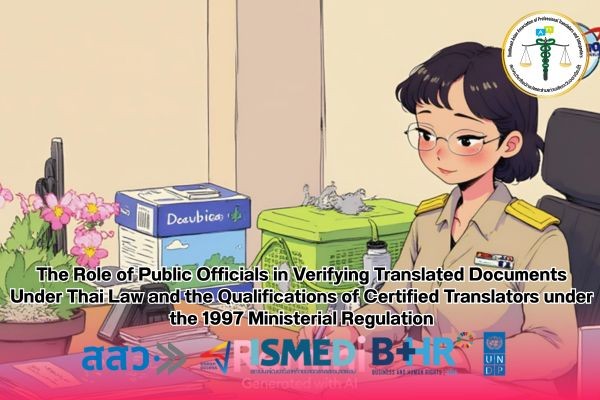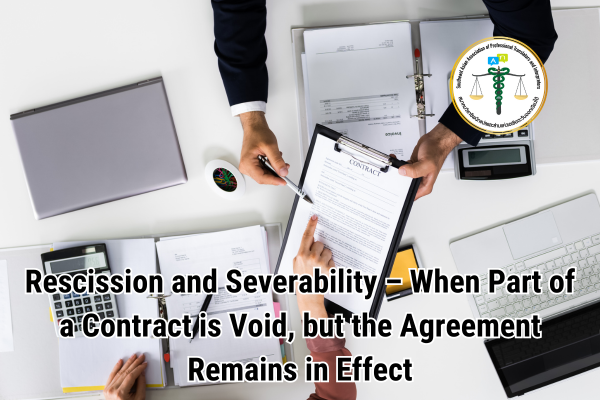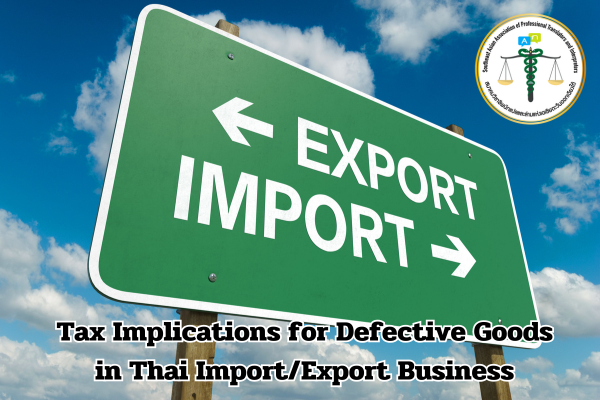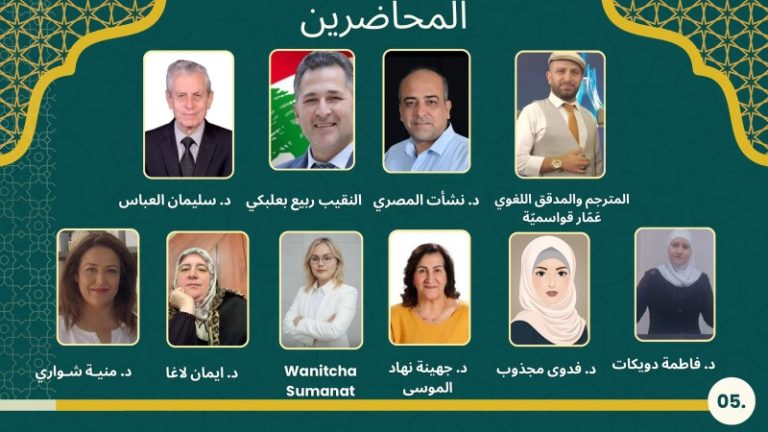The Role of Public Officials in Verifying Translated Documents Under Thai Law
and the Qualifications of Certified Translators under the 1997 Ministerial Regulation
In administrative procedures, the submission of documents originally written in a foreign language for official approval or licensing requires accurate translation and legal certification. This article analyzes the legal duties of public officials to reject or annul decisions based on improperly certified translations, according to the Ministerial Regulation (B.E. 2540 [1997]) issued under the Thai Administrative Procedure Act (B.E. 2539 [1996]). It also outlines the role of the Southeast Asian Professional Translators and Interpreters Association (SEAProTI) in certifying translators whose qualifications meet the legal requirements set forth by the Regulation.
1. Introduction
When individuals or entities submit applications to government agencies—whether for project approval, licensing, or administrative procedures—involving foreign-language documents, those documents must be translated into Thai accurately and legally certified.
In Thailand, the translation and certification of foreign-language documents are governed by the Ministerial Regulation (B.E. 2540) issued under the Administrative Procedure Act B.E. 2539, which clearly defines the qualifications of individuals or institutions authorized to certify translations.
2. The 1997 Ministerial Regulation: Key Provisions and Interpretation
The full title of this regulation is:
- “Ministerial Regulation Prescribing Rules and Procedures for the Certification of Thai Translations of Foreign-Language Documents or the Acceptance of Foreign-Language Documents, B.E. 2540 (1997)”, accessible via the Royal Thai Government Gazette at: https://ratchakitcha.soc.go.th/documents/1682425.pdf
The regulation stipulates that only the following five categories of persons or institutions are legally authorized to certify translations:
(1) Thai nationals holding at least a bachelor’s degree, with the medium of instruction being the foreign language used in the document.
(2) University lecturers in Thailand who teach the relevant foreign language.
(3) Foreign embassies or consulates in Thailand.
(4) Thai embassies or consulates abroad, and;
(5) Private-sector certified translators and translation certification providers, as clarified by a legal opinion issued by the Office of the Council of State on 28 April 2025, and endorsed by the Secretariat of the Prime Minister’s Office in correspondence with the Southeast Asian Professional Translators and Interpreters Association (SEAProTI).
3. SEAProTI and Legally Compliant Translator Qualifications
The Southeast Asian Professional Translators and Interpreters Association (SEAProTI) is a professional body that certifies translators and translation verifiers according to recognized professional standards. Translators certified by SEAProTI typically possess qualifications that align with the legal requirements of the Ministerial Regulation, such as:
- Completion of a degree program abroad, with instruction conducted in the foreign language of specialization.
- Extensive experience translating official or legal documents.
- Professional involvement in academia or collaborative activities with embassies or diplomatic missions.
- Demonstrated work history with government agencies or international organizations.
As such, translators certified by SEAProTI are deemed legally competent to prepare and certify translations in accordance with the intent of the 1997 Ministerial Regulation.
4. Legal Duties of Public Officials in Reviewing Translated Documents
Under Thai administrative law, public officials have a clear duty to ensure that any submitted translations are legally certified. Two primary responsibilities are outlined:
4.1 Rejection of Improper Translations at the Initial Stage
- If a translated document is found to be uncertified or certified by an unqualified individual, public officials are obligated to reject the document immediately and request a properly certified version from the applicant.
4.2 Annulment or Revocation After Approval
- If it is later discovered that a project or administrative action was approved based on an uncertified or improperly certified translation, public officials have the authority to revoke or annul the decision in accordance with the principle of legal correctness in administrative procedures.
5. Policy Recommendations
To promote transparency, fairness, and legal consistency in public administration, government agencies should consider implementing the following measures:
- Develop a centralized database of legally authorized translators and certifiers.
- Conduct regular training for public officials on the provisions and application of the Ministerial Regulation.
- Support professional bodies such as SEAProTI in serving as quality assurance mechanisms for translator certification and best practices development.
6. Conclusion
The role of public officials in verifying translated documents under the 1997 Ministerial Regulation is crucial to ensuring the legal validity of administrative procedures. Concurrently, the certification of translators by professional organizations such as SEAProTI enhances quality assurance, supports procedural transparency, and reinforces the rule of law in public administration. By aligning legal requirements with professional standards, Thailand can safeguard the integrity of its administrative processes and strengthen public trust in government decision-making.
SEAProTI’s certified translators, translation certification providers, and certified interpreters:
The Southeast Asian Association of Professional Translators and Interpreters (SEAProTI) has officially announced the criteria and qualifications for individuals to register as “Certified Translators,” “Translation Certification Providers,” and “Certified Interpreters” under the association’s regulations. These guidelines are detailed in Sections 9 and 10 of the Royal Thai Government Gazette, issued by the Secretariat of the Cabinet under the Office of the Prime Minister of the Kingdom of Thailand, dated July 25, 2024, Volume 141, Part 66 Ng, Page 100.
To read the full publication, visit: the Royal Thai Government Gazette
บทบาทของเจ้าพนักงานในการตรวจสอบเอกสารแปลตามกฎหมาย และคุณสมบัติของผู้รับรองการแปลตามกฎกระทรวง (พ.ศ. 2540)
ในกระบวนการพิจารณาทางปกครอง การยื่นเอกสารที่ทำขึ้นเป็นภาษาต่างประเทศเพื่อขอรับการอนุญาตหรือพิจารณาโดยหน่วยงานของรัฐ จำเป็นต้องมีการแปลและรับรองคำแปลอย่างถูกต้องตามที่กฎหมายกำหนด บทความนี้วิเคราะห์บทบาทตามกฎหมายของเจ้าพนักงานในการปฏิเสธหรือยกเลิกผลการพิจารณา หากพบว่าเอกสารแปลนั้นไม่ได้รับการแปลหรือรับรองโดยผู้มีคุณสมบัติที่ถูกต้องตามกฎกระทรวง (พ.ศ. 2540) รวมถึงอธิบายบทบาทของสมาคมวิชาชีพนักแปลและล่ามแห่งเอเชียตะวันออกเฉียงใต้ (SEAProTI) ในฐานะองค์กรที่ให้การรับรองนักแปลซึ่งมีคุณสมบัติสอดคล้องตามข้อกำหนดของกฎหมาย
1. บทนำ
การยื่นคำร้องต่อหน่วยงานของรัฐ ไม่ว่าจะเป็นการขออนุญาต ดำเนินโครงการ หรือยื่นเอกสารประกอบกิจกรรมใด ๆ ที่เกี่ยวข้องกับเอกสารภาษาต่างประเทศ จำเป็นต้องมีคำแปลเป็นภาษาไทยที่ถูกต้องทั้งในด้านภาษาและเนื้อหา ซึ่งรวมถึงความชอบด้วยกฎหมายในการรับรองเอกสารเหล่านั้นด้วย
ในประเทศไทย การแปลเอกสารภาษาต่างประเทศเป็นภาษาไทย และการรับรองคำแปลนั้น อยู่ภายใต้การควบคุมของ กฎกระทรวง (พ.ศ. 2540) ออกตามความในพระราชบัญญัติวิธีปฏิบัติราชการทางปกครอง พ.ศ. 2539 ซึ่งระบุคุณสมบัติของผู้ที่สามารถออกใบรับรองคำแปลได้อย่างชัดเจน
2. กฎกระทรวง (พ.ศ. 2540): หลักเกณฑ์และการตีความ
กฎกระทรวงฉบับนี้มีชื่อเต็มว่า “กฎกระทรวงกำหนดหลักเกณฑ์และวิธีการให้การรับรองความถูกต้องของคำแปลเป็นไทยของเอกสารที่ทำขึ้นเป็นภาษาต่างประเทศ หรือการยอมรับเอกสารที่ทำขึ้นเป็นภาษาต่างประเทศ พ.ศ. 2540” ซึ่งสามารถเข้าถึงได้ทางราชกิจจานุเบกษา: https://ratchakitcha.soc.go.th/documents/1682425.pdf
สาระสำคัญของกฎกระทรวงนี้กำหนดว่า มีเพียงบุคคลหรือองค์กรที่มีคุณสมบัติ 4 ประเภท (รวมทั้งข้อยกเว้นในวงเล็บ 5) เท่านั้นที่สามารถรับรองคำแปลได้อย่างชอบด้วยกฎหมาย ได้แก่:
(1) ผู้มีสัญชาติไทยที่สำเร็จการศึกษาระดับปริญญาตรีขึ้นไป โดยภาษาที่ใช้ในการเรียนเป็นภาษาต่างประเทศนั้น
(2) อาจารย์ในสถาบันอุดมศึกษาในประเทศไทย ที่สอนภาษานั้น
(3) สถานทูตหรือสถานกงสุลต่างประเทศในประเทศไทย
(4) สถานเอกอัครราชทูตหรือสถานกงสุลไทยในต่างประเทศ และ
(5) นักแปลรับรองของเอกชน (ตามการตีความของสำนักงานคณะกรรมการกฤษฎีกา ลงวันที่ 28 เมษายน 2568 และหนังสือแจ้งจากสำนักเลขาธิการนายกรัฐมนตรีถึงสมาคมวิชาชีพนักแปลและล่ามแห่งเอเชียตะวันออกเฉียงใต้)
3. SEAProTI กับคุณสมบัติที่สอดคล้องตามกฎหมาย
สมาคมวิชาชีพนักแปลและล่ามแห่งเอเชียตะวันออกเฉียงใต้ (SEAProTI) เป็นองค์กรวิชาชีพที่จัดสอบและรับรองนักแปลและผู้รับรองการแปลตามมาตรฐานวิชาชีพ โดยนักแปลที่ผ่านการรับรองจาก SEAProTI มักมีคุณสมบัติตรงตามข้อกำหนดในกฎกระทรวง เช่น
- สำเร็จการศึกษาจากต่างประเทศ โดยใช้ภาษาต่างประเทศเป็นภาษาหลักของหลักสูตร
- มีประสบการณ์ในการแปลเอกสารราชการ หรือเอกสารกฎหมาย
- ทำหน้าที่สอนในมหาวิทยาลัยหรือร่วมมือกับสถานเอกอัครราชทูตในกิจกรรมที่เกี่ยวข้องกับการใช้ภาษา
- มีประวัติการทำงานกับภาครัฐหรือองค์กรระหว่างประเทศ
ดังนั้น นักแปลที่ได้รับการรับรองจาก SEAProTI จึงสามารถจัดทำและรับรองคำแปลได้อย่างถูกต้องตามเจตนารมณ์ของกฎกระทรวง
4. บทบาทของเจ้าพนักงานตามกฎหมาย
กฎหมายได้มอบอำนาจและหน้าที่โดยตรงให้แก่เจ้าพนักงานในการควบคุมคุณภาพของเอกสารที่ยื่นต่อหน่วยงาน โดยมีข้อพึงระวังดังนี้:
4.1 การปฏิเสธเอกสารตั้งแต่ต้นทาง
หากเจ้าพนักงานตรวจพบว่าเอกสารที่ยื่นมานั้น ไม่ได้แปลหรือรับรองโดยผู้มีคุณสมบัติตามกฎหมาย เจ้าพนักงาน มีหน้าที่ต้องปฏิเสธเอกสารนั้นทันที และให้ผู้ยื่นจัดหาเอกสารแปลใหม่ที่ถูกต้องมา
4.2 การเพิกถอนหรือยกเลิกภายหลัง
หากปรากฏภายหลังว่าโครงการหรือกิจกรรมใด ๆ ได้รับอนุมัติบนพื้นฐานของเอกสารที่ไม่ได้แปลหรือรับรองโดยผู้ที่มีสิทธิรับรองตามกฎหมาย เจ้าพนักงานสามารถพิจารณา เพิกถอนการอนุมัติหรือยกเลิกโครงการนั้นได้ ตามหลักความชอบด้วยกฎหมายของกระบวนการทางปกครอง
5. ข้อเสนอแนะเชิงนโยบาย
เพื่อให้เกิดความโปร่งใสและความสม่ำเสมอในการพิจารณาเอกสารแปล หน่วยงานของรัฐควรพิจารณานำข้อเสนอแนะต่อไปนี้ไปใช้:
- จัดทำ ฐานข้อมูลกลางของนักแปลและผู้รับรองคำแปลที่ได้รับการรับรองตามกฎหมาย
- ให้เจ้าพนักงานได้รับการอบรมเกี่ยวกับหลักเกณฑ์ในกฎกระทรวงอย่างต่อเนื่อง
- ส่งเสริมให้องค์กรวิชาชีพ เช่น SEAProTI ทำหน้าที่เป็นกลไกกลางในการตรวจสอบคุณภาพนักแปลและพัฒนาแนวปฏิบัติมาตรฐาน
6. บทสรุป
บทบาทของเจ้าพนักงานในการตรวจสอบเอกสารแปลภายใต้กฎกระทรวง (พ.ศ. 2540) เป็นภารกิจสำคัญที่มีผลโดยตรงต่อความชอบด้วยกฎหมายของกระบวนการทางปกครอง ขณะเดียวกัน การรับรองนักแปลโดยองค์กรวิชาชีพ เช่น SEAProTI ช่วยสร้างหลักประกันด้านคุณภาพ และส่งเสริมให้กระบวนการพิจารณาทางราชการมีความน่าเชื่อถือ โปร่งใส และเท่าเทียมตามหลักธรรมาภิบาล
เกี่ยวกับนักแปลรับรอง ผู้รับรองการแปล และล่ามรับรองของสมาคมวิชาชีพนักแปลและล่ามแห่งเอเชียตะวันออกเฉียงใต้
สมาคมวิชาชีพนักแปลและล่ามแห่งเอเชียตะวันออกเฉียงใต้ (SEAProTI) ได้ประกาศหลักเกณฑ์และคุณสมบัติผู้ที่ขึ้นทะเบียนเป็น “นักแปลรับรอง (Certified Translators) และผู้รับรองการแปล (Translation Certification Providers) และล่ามรับรอง (Certified Interpreters)” ของสมาคม หมวดที่ 9 และหมวดที่ 10 ในราชกิจจานุเบกษา ของสำนักเลขาธิการคณะรัฐมนตรี ในสำนักนายกรัฐมนตรี แห่งราชอาณาจักรไทย ลงวันที่ 25 ก.ค. 2567 เล่มที่ 141 ตอนที่ 66 ง หน้า 100 อ่านฉบับเต็มได้ที่: นักแปลรับรอง ผู้รับรองการแปล และล่ามรับรอง

























